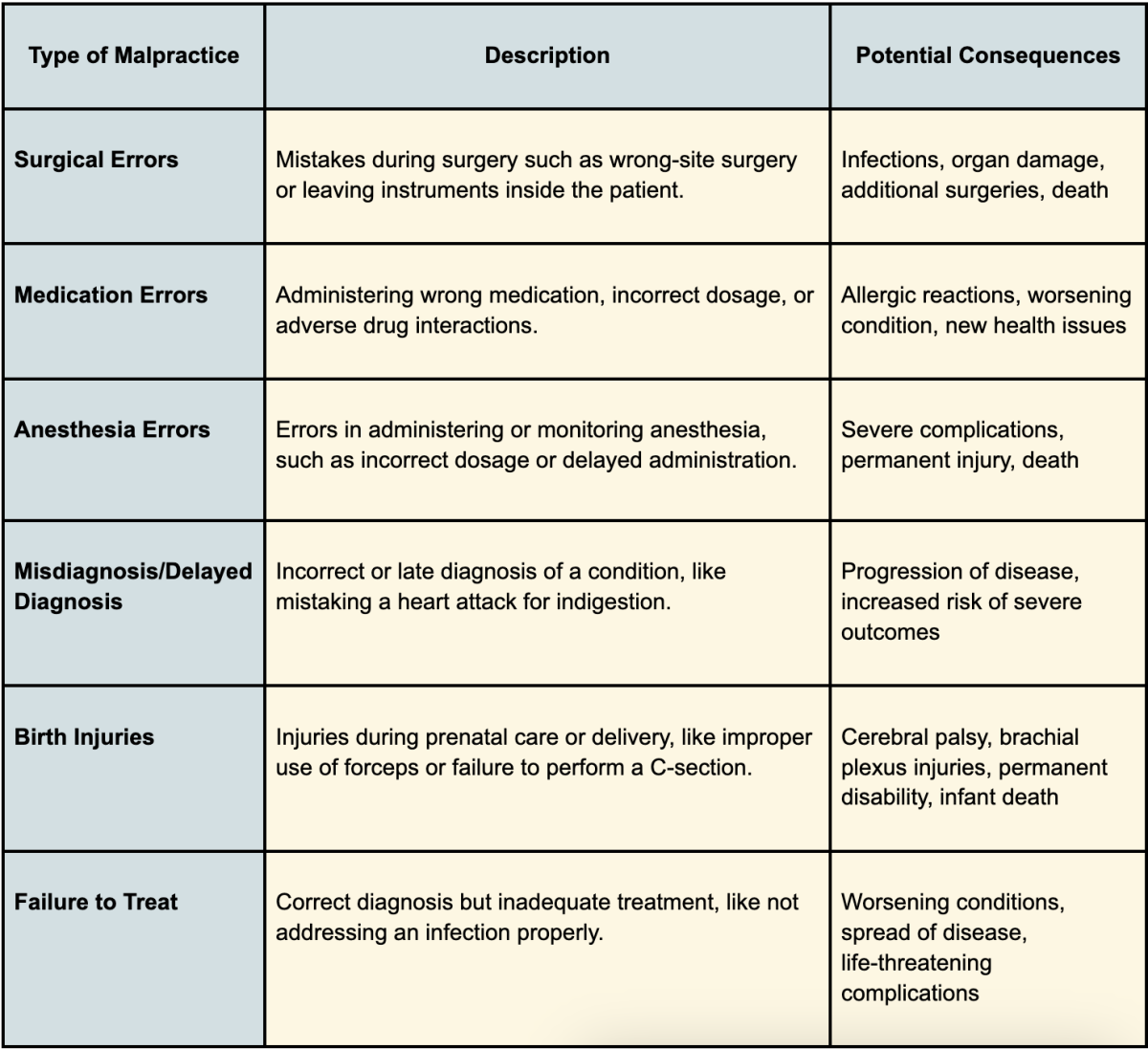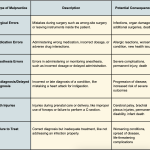Introduction to Medical Malpractice
Common types of medical malpractice, such as surgical errors, misdiagnoses, medication mistakes, and birth injuries, involve medical negligence and create standing for legal action.
Medical malpractice occurs when a healthcare provider deviates from the standard of care and causes harm to the patient.
There are many different types of medical malpractice. It is important to understand the signs so you can look out for yourself and your loved ones.
This article from Lancaster PA Personal Injury Attorneys RG Injury Law explains some of the most common instances of medical malpractice, how to recognize them, and the risks they pose.
Key Takeaways:
- Misdiagnosis and delayed diagnosis are prevalent issues.
- Surgical errors have severe consequences.
- Medication and anesthesia errors often lead to harm.
- Birth injuries result from negligence during prenatal or delivery care.
- Failure to treat can be equally damaging.
Common Types of Medical Malpractice

Misdiagnosis and Delayed Diagnosis
Misdiagnosis and delayed diagnosis are two of the most common forms of medical malpractice. They occur when a doctor incorrectly diagnoses a condition or fails to diagnose it in a timely manner.
For example, a heart attack might be misdiagnosed as indigestion or anxiety. Misdiagnoses like this have led to delayed treatment and increased damage.
Cancer could be mistaken for benign tumors, going untreated and allowing the disease to progress to more advanced stages.
Similarly, a stroke might be misinterpreted as a migraine.
Care providers are required to give the attention to detail necessary to properly diagnose their patients.
Surgical Errors
Surgical errors can have life-altering consequences.
These mistakes occur during surgery and can include operating on the wrong site, leaving surgical instruments inside the patient, and anesthesia errors.
Surgical errors not only compromise the patient's health but can also lead to long-term complications, additional surgeries, and even death.
Common surgical errors include:
- Wrong-site surgery: Operating on the wrong part of the body.
- Retained surgical instruments: Leaving tools or sponges inside the patient.
- Anesthesia errors: Incorrect administration or monitoring of anesthesia.
- Surgical site infections: Infections acquired during surgery.
- Nerve damage: Injuries to nerves during surgical procedures.
Medication Errors
Medication errors are another serious form of medical malpractice.
These occur when a patient receives the wrong medication, an incorrect dosage, or experiences adverse drug interactions.
Common medication errors:
- Wrong medication: Dispensing a drug that is not intended for the patient.
- Incorrect dosage: Administering too much or too little of a medication.
- Adverse drug interactions: Combining drugs that should not be taken together.
- Incorrect route of administration: Delivering medication through the wrong method (e.g., oral instead of intravenous).
- Failure to review allergies: Administering medication to which the patient is allergic.
Anesthesia Errors
Anesthesia errors can be particularly dangerous and occur before, during, or after surgery.
These errors can result in severe complications or death.
Common anesthesia errors:
- Dosage mistakes: Incorrect amounts of anesthesia.
- Failure to monitor vital signs: Not keeping track of patient's vital signs during surgery.
- Delayed administration: Administering anesthesia too late or too early, affecting the procedure's outcome.
Birth Injuries
Prenatal Negligence
Prenatal negligence occurs when healthcare providers fail to diagnose or manage conditions during pregnancy.
This can include missing signs of fetal distress, not identifying maternal infections, or failing to diagnose congenital conditions.
Early detection and proper management are critical to prevent complications and ensure the health of both mother and baby.
Delivery Room Errors
Delivery room errors involve mistakes made during labor and delivery.
Common issues include improper use of forceps and vacuum extractors, and failure to perform timely C-sections.
These errors can result in serious injuries such as cerebral palsy, brachial plexus injuries, and even death.
Ensuring appropriate action and careful monitoring during delivery is vital for a safe birth process. (1)
Failure to Treat
Failure to treat occurs when a healthcare provider correctly diagnoses a condition but fails to provide adequate treatment.
This negligence can lead to worsening conditions, complications, and even death.
Timely and appropriate treatment is essential for patient recovery and health. When conditions like infections or chronic illnesses are not treated properly, patients can experience severe outcomes such as the spread of infection, organ damage, or life-threatening complications.
Common cases of failure to treat include:
- Infections: Treated Outcome: Recovery | Untreated Outcome: Spread of infection, sepsis.
- Hypertension: Treated Outcome: Controlled blood pressure | Untreated Outcome: Increased risk of stroke.
- Diabetes: Treated Outcome: Managed blood sugar levels | Untreated Outcome: Organ damage, diabetic coma.
- Cancer: Treated Outcome: Remission or management | Untreated Outcome: Progression to advanced stages, metastasis.
- Heart Disease: Treated Outcome: Improved heart function, reduced symptoms | Untreated Outcome: Heart attack, heart failure.
Wrapping Up: Medical Malpractice Attorneys in Lancaster PA
Understanding common types of medical malpractice, such as surgical errors, medication errors, anesthesia errors, birth injuries, and failure to treat, is necessary for recognizing potential claims.
Each type presents unique challenges that require comprehensive evidence and expert testimony to address effectively.
RG Injury Law in Lancaster, PA, specializes in personal injury and workers' compensation cases including medical malpractice.
Our expertise will get you the compensation you deserve. Our attention to detail will forge the strongest case proving your standing for medical malpractice compensation.
Call today for Lancaster's top personal injury attorneys!
Reference:
- Medical Liability/Medical Malpractice Laws, National Conference of State Legislatures, https://www.ncsl.org/financial-services/medical-liability-medical-malpractice-laws














